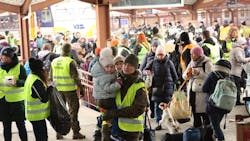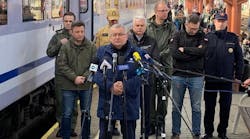Intercity and intercountry transport networks are moving the masses fleeing war in Ukraine
The United Nations (UN) reports more than one million people have fled Ukraine following Russia’s assault on the country that began Feb. 24 and warns that without an end to the conflict, millions more are expected to flee the country. The UN says the situation could become Europe’s largest refugee crisis this century.
Moving people on this scale within a short timeframe has taken resources from multiple European countries, private companies, technology and Europe’s reliable and interconnected passenger transportation network.
As Mass Transit previously reported, rail providers in Poland (where more than half of refugees go), Czech Republic, Germany, Austria, Slovakia, Hungary, Denmark, The Netherlands, France and Lithuania have offered Ukrainian refugees free passage with proof of citizenship.
Omio, an online travel comparison and booking website, has set up a resource page for users to find transport providers operating within Ukraine. Ecolines, Euroticket, Infobus, Sinbad, Flixbus, Deutsche Touring, PKS Polonus and Eurolines LT are intercity bus companies while Ukrainian Railways is a passenger and freight provider. Omio lists cities within Ukraine along with carriers operating in those cities. The site also includes rail, air and bus companies offering Ukrainian residents free travel once they reach European borders.
Ukrainian Railways continues to regularly post to its Facebook page and Telegram account to provide updated schedules, which are shared around 9:00 p.m. for the next day. An updated map of operational stations and connections on March 3 does not differ significantly from a similar map posted Feb. 27, showing rail movement within the country remains possible.
However, Kyiv, Ukraine’s capital, is running out of food, prompting humanitarian action.
One of Europe’s private rail operators, RegioJet, is partnering with Ukrainian Railways, Člověk v tísni (People-In-Need – a non-profit organization) and ČD Cargo & Rail Cargo Group on a humanitarian and evacuation night train between Prague, Czech Republic and Przemyśl station in Poland, just on the border with Ukraine. The train consists of 10 sleeping cars with 400 beds for evacuees and 10 freight cars carrying up to 600 pallets of food. At the Poland/Ukrainian border, a switch is made with Ukrainian Railways where the cargo continues to Kyiv and passengers are taken out of Ukraine. The first of these night trains started March 1.
ALLRAIL, the Alliance of Passenger Rail New Entrants in Europe, which represents independent passenger rail companies including RegioJet, commended the swift actions of European rail providers.
“While Russia’s aggression continues, these actions must have top priority in the European rail sector. All of the companies and personnel involved are doing amazing work,” said ALLRAIL Secretary General Nick Brooks.
As remarkable as the humanitarian effort has been since the crisis began, peace remains the ultimate goal.
“International solidarity has been heartwarming,” UN High Commissioner for Refugees Filippo Grandi said on Thursday. “But nothing – nothing – can replace the need for the guns to be silenced; for dialogue and diplomacy to succeed. Peace is the only way to halt this tragedy.”
--------------------------
The war in Ukraine has far reaching implications. Our colleagues at Endeavor Business Media, which owns Mass Transit, have been covering the impacts from all angles. Coverage has been compiled and is viewable through this link.

Mischa Wanek-Libman | Group Editorial Director
Mischa Wanek-Libman is director of communications with Transdev North America. She has more than 20 years of experience working in the transportation industry covering construction projects, engineering challenges, transit and rail operations and best practices.
Wanek-Libman has held top editorial positions at freight rail and public transportation business-to-business publications including as editor-in-chief and editorial director of Mass Transit from 2018-2024. She has been recognized for editorial excellence through her individual work, as well as for collaborative content.
She is an active member of the American Public Transportation Association's Marketing and Communications Committee and served 14 years as a Board Observer on the National Railroad Construction and Maintenance Association (NRC) Board of Directors.
She is a graduate of Drake University in Des Moines, Iowa, where she earned a Bachelor of Arts degree in Journalism and Mass Communication.




